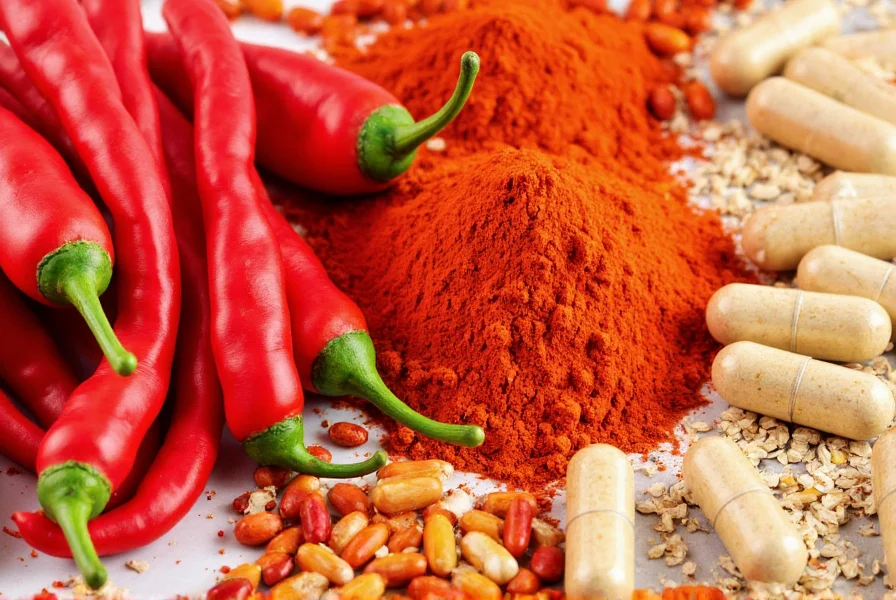Understanding Cayenne Red Pepper and Its Active Components
Cayenne pepper (Capsicum annuum), a vibrant red chili pepper, has been used for centuries in both culinary and traditional medicine practices. The distinctive heat and therapeutic properties come primarily from capsaicin, a bioactive compound concentrated in the pepper's placental tissue. Modern research has validated many traditional uses while uncovering new potential health applications.

The Science Behind Capsaicin
Capsaicin works by interacting with TRPV1 receptors, which are part of our sensory nervous system. These receptors typically respond to heat, and when activated by capsaicin, they trigger various physiological responses. This mechanism explains both the immediate burning sensation and the longer-term therapeutic effects. Scientific evidence for cayenne pepper health benefits continues to grow as researchers explore its potential applications across multiple health domains.
Key Health Benefits Supported by Research
Metabolism and Weight Management Effects
Multiple studies demonstrate that capsaicin can increase energy expenditure and fat oxidation. Research published in the Journal of Nutritional Science and Vitaminology found that consuming 10 grams of red pepper increased metabolic rate by approximately 23% in participants. This thermogenic effect makes cayenne pepper a valuable component in natural metabolism-boosting strategies. The compound also appears to reduce appetite and decrease calorie intake, particularly for fatty and sweet foods.
Natural Pain Relief Properties
Topical capsaicin creams (containing 0.025%-0.075% capsaicin) have received FDA approval for pain management. The mechanism involves depleting substance P, a neuropeptide that transmits pain signals. Clinical trials show significant improvement for conditions including:
- Osteoarthritis and rheumatoid arthritis pain
- Neuropathic pain from diabetes
- Post-herpetic neuralgia (shingles pain)
- Muscle and joint discomfort
Regular consumption may also provide systemic pain relief through similar mechanisms, making how cayenne pepper helps with pain relief a well-documented benefit.
Cardiovascular Health Support
Research indicates cayenne pepper can positively influence several cardiovascular markers. Studies show it may help:
| Cardiovascular Factor | Effect of Cayenne Pepper | Research Status |
|---|---|---|
| Blood Pressure | May promote vasodilation and lower systolic pressure | Multiple human studies |
| Cholesterol Levels | Potential reduction in LDL and triglycerides | Animal and limited human studies |
| Blood Clotting | May reduce platelet aggregation | Preliminary research |
| Arterial Health | Potential improvement in endothelial function | Emerging evidence |
These cayenne pepper cardiovascular benefits research findings suggest regular moderate consumption may support heart health, though more extensive human trials are needed.
Digestive System Enhancement
Contrary to popular belief, cayenne pepper generally supports digestive health rather than causing harm. Research published in Digestion journal found capsaicin stimulates digestive enzyme production and may protect against stomach ulcers by increasing mucosal defense. The compound appears to:
- Stimulate production of digestive enzymes
- Promote healthy gut motility
- Support beneficial gut bacteria
- Reduce symptoms of indigestion in many individuals
However, those with existing gastrointestinal conditions should consult healthcare providers before increasing cayenne consumption.
Anti-Inflammatory Properties
Chronic inflammation underlies many modern diseases, and cayenne shows promise as a natural anti-inflammatory agent. The natural anti-inflammatory properties of cayenne work through multiple pathways:
- Inhibition of inflammatory cytokines
- Modulation of NF-kB pathway (key inflammation regulator)
- Reduction of oxidative stress markers
- Support for healthy immune response
These mechanisms contribute to cayenne's potential benefits for inflammatory conditions when consumed as part of a balanced diet.
Safety Considerations and Proper Usage
While cayenne pepper is safe for culinary use, therapeutic applications require careful consideration:
- Start with small amounts (1/8 to 1/4 teaspoon daily) and gradually increase
- Therapeutic doses typically range from 30-120 mg of capsaicin daily
- May interact with blood thinners, diabetes medications, and ACE inhibitors
- Can cause gastrointestinal discomfort in sensitive individuals
- Avoid contact with eyes and sensitive skin areas
Consult a healthcare provider before using cayenne for specific health conditions, especially if pregnant, nursing, or managing chronic health issues. The safe consumption of cayenne pepper for health depends on individual factors and existing health conditions.

Practical Ways to Incorporate Cayenne Into Your Diet
Adding cayenne to your daily routine doesn't require drastic changes. Consider these simple approaches:
- Mix 1/8 teaspoon into warm water with lemon for a morning tonic
- Add to soups, stews, and sauces for enhanced flavor and benefits
- Combine with honey for a soothing throat remedy
- Use in spice blends for roasted vegetables
- Incorporate into protein shakes or smoothies
Remember that consistency matters more than large single doses when seeking the cayenne red pepper metabolism effects and other health benefits.
Limitations of Current Research
While promising, scientific evidence for cayenne pepper health benefits has some limitations:
- Many studies use concentrated capsaicin rather than whole pepper
- Long-term human studies are limited
- Optimal dosing isn't precisely established for all benefits
- Individual responses vary significantly
- Most research focuses on specific isolated effects rather than holistic health outcomes
Cayenne pepper should be viewed as a complementary component of a healthy lifestyle rather than a standalone treatment for medical conditions.
Conclusion
Cayenne red pepper offers multiple scientifically supported health benefits when used appropriately. From metabolism enhancement to natural pain management and cardiovascular support, this vibrant spice provides valuable compounds that interact with our physiology in beneficial ways. The key to maximizing cayenne red pepper health benefits lies in consistent, moderate consumption as part of a balanced diet and healthy lifestyle. As research continues to evolve, we may discover additional applications for this ancient remedy in modern health practices.
Frequently Asked Questions
How much cayenne pepper should I take daily for health benefits?
For general health benefits, most research suggests 30-120 mg of capsaicin daily, equivalent to about 1/8 to 1/2 teaspoon of cayenne pepper powder. Start with smaller amounts (1/8 teaspoon) and gradually increase as your body adjusts. Therapeutic doses should be discussed with a healthcare provider, especially if you have existing health conditions or take medications.
Can cayenne pepper help with weight loss?
Research indicates cayenne pepper may support weight management through several mechanisms: increasing thermogenesis (calorie burning), reducing appetite, and potentially enhancing fat oxidation. Studies show it can increase metabolic rate by approximately 23% and reduce calorie intake, particularly from fatty foods. However, it works best as part of a comprehensive approach including balanced nutrition and regular exercise, not as a standalone weight loss solution.
Is cayenne pepper safe for people with stomach ulcers?
Contrary to popular belief, moderate cayenne consumption may actually benefit those with stomach ulcers. Research shows capsaicin stimulates protective mucus production in the stomach lining and has antibacterial properties against H. pylori, a common ulcer cause. However, during active ulcer flare-ups, consult your healthcare provider before adding cayenne, as individual responses vary. Start with very small amounts if approved by your doctor.
How quickly do cayenne pepper health benefits appear?
Some effects like temporary pain relief from topical application can occur within 30-60 minutes. Metabolic effects may be noticeable within hours of consumption. For longer-term benefits like improved circulation or reduced inflammation, consistent daily use for 2-4 weeks is typically needed before noticeable changes occur. The timeframe varies based on the specific benefit, dosage, and individual physiology.
Can I take cayenne pepper with blood pressure medication?
Cayenne pepper may interact with certain blood pressure medications, particularly ACE inhibitors, potentially causing excessive blood pressure reduction. If you're taking blood pressure medication, consult your healthcare provider before using cayenne therapeutically. Culinary amounts (small pinches in food) are generally safe, but therapeutic doses require medical supervision to avoid potential interactions.











 浙公网安备
33010002000092号
浙公网安备
33010002000092号 浙B2-20120091-4
浙B2-20120091-4